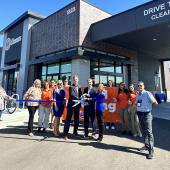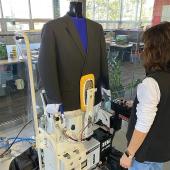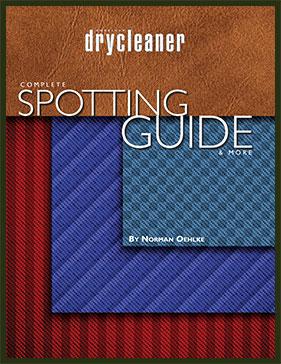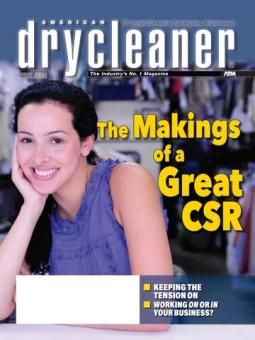The Makings of a Great Drycleaning CSR (Part 1)

CHICAGO — Customer service representatives (CSRs) are often the first, last and sometimes only point of contact your customers have with your drycleaning business. A tight labor market might tempt owners to hire the first live body through the door when filling positions, but hastily made decisions in finding CSRs can have ramifications for the entire business.
So, what should dry cleaners look for when they need to fill this vital role?
Certain skills can be trained and encouraged, but great CSRs possess some innate talents when they first walk through the door.
“First and foremost, it’s their attitude,” says Jennifer Whitmarsh, owner of Snappy Dry Cleaning in Williamsville, New York. “It’s not tactical skill. It’s how they are as a person, how they approach problems, and how they behave when no one’s looking. Anything else can be taught, but we can’t teach a positive attitude.”
While this seems like a simple idea, Whitmarsh says it’s a critical distinction in the hiring process.
“I know that might sound cliche, but in my years of experience, that’s been the common denominator between a rock-star CSR and a just-OK one,” she says. “Obviously, if they’ve got a bad attitude, then they’re not even going to be an OK CSR. There are other things to look for, such as being able to multitask and solve problems, but, really, everything comes down to their attitude and their approach to life.”
“Behaviors of a great CSR include their communication skills, their listening skills, their attentiveness and their empathy,” says Jennifer Davis, training and development people manager for the ZIPS Cleaners network of drycleaning stores. “These attributes lead to an overall positive experience for our customers. A great CSR has to read the customer in the situation. For example, if they’re in a hurry, or on their way to work, they need to read that in the customer and use that to lead their interaction.”
Davis echoes Whitmarsh’s views on what can be taught — and what can’t be.
“When we’re hiring, we’re looking for someone who is friendly, has a positive attitude, clear communication skills, is patient, and they’re willing to go above and beyond,” she says. “When they have those attitudes, that’s great for us because they can be taught the ZIPS way. So, attitude and personality are key traits, and we know we can teach them about the garment’s journey so they can be knowledgeable about everything we offer and best serve our customers.”
Owners can tell a lot about a prospective CSR from the very beginning.
“How do they behave when you’re interviewing them?” Whitmarsh asks. “How are they answering the phone? Can they have a conversation with a stranger? Because, essentially, all the customers who come in are going to be strangers at first. Do they have a smile on their face? Are they making good eye contact? Do they have good listening skills? Those would be things to look for when you’re talking with a potential individual for this role.”
“We tell our franchisees, owners, managers, or whoever is doing the hiring that they should consider experience, attitude and willingness to learn, and then consider their overall interaction with the person who comes as the candidate,” Davis says. “And keep in mind that, while they may not have experience, they need to be trainable. If someone is trainable, they’re a great hire. They are willing to learn and show us that by asking questions and being excited about the interview.”
The old saying “Act in haste, repent in leisure” is true for making any hiring decisions, Whitmarsh says, but especially for customer-facing roles.
“We have to resist the temptation to just hire somebody because you want them to work out and make them fit,” she says. “The No. 1 way to demotivate the team around them is just to hire a warm body. It increases the frustrations for everybody involved.”
The path to success for a CSR begins by being honest in the interview stage, Whitmarsh adds.
“You need to have a good onboarding process,” she says, “which includes great interview questions and even telling the individual the not-so-awesome parts of the job. If you paint it like it’s rainbows and butterflies all the time, you’re setting expectations up in a way where the CSR is going to be surprised and upset as soon as it’s not.”
This honesty not only screens out people who wouldn’t be a good fit, it gives those who might be right for the role an accurate picture of their day-to-day activities.
“Let them know that, yes, sometimes we get an upset customer,” Whitmarsh says. “We get garments that are less exciting to inspect. Give them a more realistic representation of what they can expect. If you do, you’re going to set up their foundation for success, as opposed to setting it up to develop cracks and then crumble.”
Come back Tuesday for Part 2 of this series, where we’ll explore the training new CSRs need to bring out their best.

Father, Son Expand Idaho Tide Cleaners Franchise

Keeping the Tension On (Conclusion)

Rana Wins AWGS Barth Memorial Award of Excellence

Keeping the Tension On (Part 2)

Report: Small-Business Optimism Falls as Inflation Looms as Top Challenge

Keeping the Tension On (Part 1)

Rothmann Retires from Tuchman Advisory Group

Working On or In Your Business?

Report: Small-Business Employment Slows

Caring for Your Customers’ Couture Clothing (Conclusion)
Podcasts for You
What It Takes to Create a Drycleaning Plant

Jon Simon of Parkway Custom Drycleaning shares his experiences of starting a new plant, from selecting the location to moving his operations to setting up shop — along with the surprises he found along the way.
Journeys: From Bogota to Florida with Salomon Mishaan

Come along for the ride with Salomon Mishaan, owner of OXXO Care Cleaners, as he explains how he journeyed from his home in Bogota, Columbia, to Florida, to become a drycleaning owner and franchisor.
Building a Cohesive Staff

Jeff Jordan of Fabritec International shares ways he’s found to form a team atmosphere in a business. We discuss why it’s important in a drycleaning company, the role of management in fostering this feeling in a plant, and how to avoid common morale killers.
From the Research Center
The Complete Spotting Guide & More

Attracting Customers & Increasing Profits—Drycleaning Marketing 101

How to Profit by Going Green: Simple Strategies That Are Friendly to The Earth & The Bottom Line

Latest Digital Editions
Digital EditionAmerican DrycleanerApril 2024

- The Makings of a Great CSR
- Keeping the Tension On
- Working On or In Your Business?

